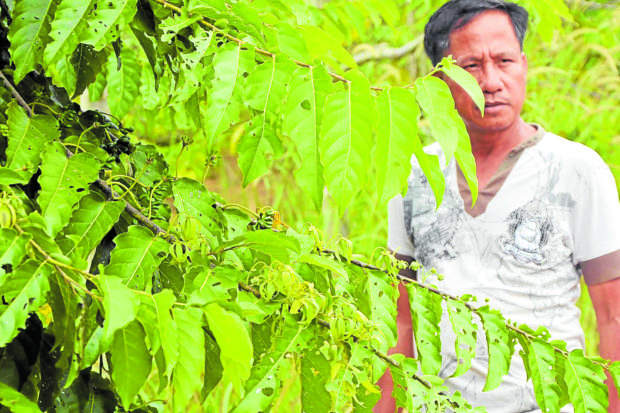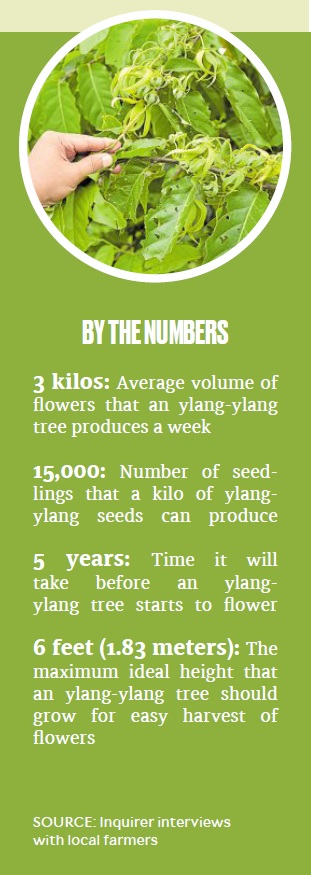Fragrance from Pangasinan mountains

HIGHLAND FARMS The construction of Daang Katutubo, shown in this 2019 photo taken in Aguilar, Pangasinan, ismeant to cut travel time between the provinces of Pangasinan and Zambales and boost local tourism and trade. Farmers in this mountain area also benefit from taking care of ylang-ylang plantations that provide livelihood to local communities. —WILLIE LOMIBAO
MANGATAREM, Pangasinan, Philippines — The sweet fragrance of ylang-ylang (Cananga odorata) flowers, freshly picked from the mountains of three Pangasinan towns, is now in a bottle.
The perfume is being produced by the Philippine Ylang-ylang Foundation Inc. at an ylang-ylang oil extraction facility located in this agricultural town where the mountain road Daang Kalikasan passes through plantations that were started five years ago.
More plantations were also established in the mountains of Aguilar, that is traversed by another mountain road called Daang Katutubo,”and in Bugallon.
“This is the country’s rebirth of the ylang-ylang essential oil industry,” Fred Reyes, the foundation chair and owner of Chemworld Fragrance Factory, told the Inquirer in a recent interview.
Ylang-ylang essential oil is highly prized by perfume makers in France and Germany, and are ready markets for the delicately scented oil, said Reyes.
Article continues after this advertisementIt takes 100 kilos of the droopy mountain flowers to produce a kilo of essential oil, he said.
Article continues after this advertisement“Freshly picked flowers in the early morning are best for distilling, so we put up the factory in the town for easy access to farmers,” Reyes said during the blessing and inauguration of the ylang-ylang extraction facility in Barangay Bueno last month.

BLOOMING Ylang-ylang trees are in full bloom giving a plantation in Aguilar, Pangasinan, a sweet and natural scent. —RAY B. ZAMBRANO
Quality grade
Before extraction commences, the factory sorts harvested ylang-ylang according to grade—A for bright yellow and fresh flowers, B for the greenish or not very ripe blossoms, and C for the brownish or overly ripe flowers.
Reyes said the facility would be bottling the highest quality Grade A “kakang oil,” which is used as an ingredient in perfumes.
It will also produce Grade B bottled oil for soap or room sprays, and Grade C bottles filled with floral water.
The foundation is composed of various people’s organizations, which are contracted to plant and manage ylang-ylang tree plantations by the Department of Environment and Natural Resources (DENR).
Reyes and his high school classmate and friend, Lingayen Mayor Leopoldo Bataoil, conceived of a plan to fill up the almost barren mountains with ylang-ylang plantations in 2015 and quickly tapped the National Greening Program, a DENR-led project aimed at rehabilitating the country’s forests and providing alternative livelihood to communities.
“Why not plant trees that produce the yellow, fragrant flowers so the farmers can have additional income?” Bataoil said.
A hectare of land can be planted with 300 trees and each tree can produce a kilo of flowers every month. The oil factory buys fresh flowers for P40 to P60 a kilo, depending on grade, Bataoil said.

SCENT FACTORY An ylang-ylang extraction facility inaugurated last month in Mangatarem, Pangasinan province, will produce essential oil, a major ingredient for products like perfume and soap. The facility in Barangay Bueno will help residents earn extra income by selling ylang-ylang flowers and its extracts. —PHOTOS BY WILLIE LOMIBAO AND RAY B. ZAMBRANO
Regaining status
If all the flowers are Grade A or first class, at P60 a kilo, 300 trees can earn the farmer P18,000 a month, he said.
The Pangasinan initiative could help the country regain its status as the world’s top ylang-ylang oil producer, which it lost to Madagascar, a colony of France, Reyes said.
Madagascar, however, eventually cut down its ylang-ylang trees when farm prices were undercut by buyers.
While most of the trees are thriving, production has not been sufficient for the factory’s daily 250-kilo requirement, Reyes said.
“[But] we already put up the distillation factory to show the farmers that we are serious about this endeavor. We hope to encourage them to plant more and to take care of the already grown, flowering trees,” Reyes said.
The factory is expected to go into full production in two years.
